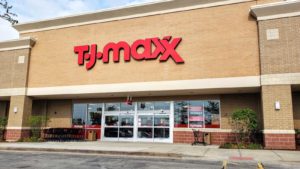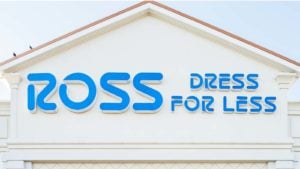On the other hand, mid-level and middle-income targeting retailers have struggled as the middle class shrinks. That means the smart retail stocks to buy are those furnished by companies that focus on low costs for their consumers at a time when all other costs are high.
As such, the three companies selected for this article derive their revenues primarily from affordable high-quality products their customers rely on. These kinds of retail stocks to buy also tend to perform well in recessions and over long periods.
TJX Companies (TJX)

The owner of the T.J. Maxx, Marshalls and HomeGoods stores, TJX Companies (NYSE:TJX), has seen solid growth in a period marked by a decline for most other retail companies. That is because TJX’s brands have successfully navigated the high inflation that has constricted so much consumer spending.
A major part of this success stems from the company’s business model, which strategically collects overstocked branded clothing to sell at extensive markdowns. This entices consumers with its brand appeal and low prices, which increases revenues for TJX’s stores, especially in times when Americans need to buy new clothes and home goods.
Ultimately, TJX also commands a large share of the discount clothing and decor market, as its ownership of several brands means it has more than 4,900 stores across the U.S. to draw consumers into. Furthermore, the reputation of these stores tends to be better than other discount retail brands, which further improves TJX’s long-term prospects among retail stocks to buy.
Burlington Stores (BURL)

While not as famous as TJX’s brands for carrying bargain deals on sought-after brands, Burlington Stores (NYSE:BURL) has performed well over the last six months in comparison to other retail companies. Like TJX, the company focuses on offering low-cost items such as clothing and home decor to consumers looking for a deal.
Where it differs is in pricing because Burlington tries to offer the lowest possible price while managing an operational level of profit margin. That approach led to exciting first-quarter earnings report metrics for its 2025 fiscal year. The company saw an 11% growth in sales year-over-year to reach $2.36 billion for the quarter. That came alongside a net income of $79 million, representing a 139% increase year over year for the metric.
Depending on how Burlington uses these profits, it could become a strong long-term position for investors looking for unique retail stocks to buy.
Ross Stores (ROST)

Perhaps one of the most famous examples of the discount store business model, Ross Stores (NASDAQ:ROST) continues to be one of the more stable retail companies on the market. Unlike TJX, the company focuses on offering rock-bottom prices to liquidate inventory at any cost. That is because Ross Stores are often the last stop on a garment’s journey to being sold.
Thus, if it doesn’t sell at Ross, it likely won’t sell anywhere. The company has applied this business model for the majority of its history and has seen general success in the first six months of this year thanks to it.
The company’s current price-to-earnings ratio sits at 24.63x alongside a dividend yield of 1.01%. That makes it an attractive option for investors as it’s not overvalued and can be used to reinvest returns in the long run.
On the date of publication, Viktor Zarev did not have (either directly or indirectly) any positions in the securities mentioned in this article. The opinions expressed in this article are those of the writer, subject to the InvestorPlace.com Publishing Guidelines.
Viktor Zarev is a scientist, researcher, and writer specializing in explaining the complex world of technology stocks through dedication to accuracy and understanding.
